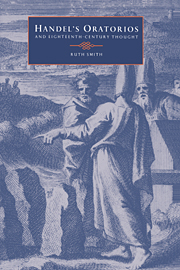Book contents
- Front Matter
- Contents
- Acknowledgements
- Abbreviations
- Introduction
- PART 1 ENGLISH ORIGINS OF ENGLISH ORATORIO
- PART II THE PATRIOT LIBRETTO FROM THE EXCISE BILL TO THE JEW BILL: ISRAELITE ORATORIOS AND ENGLISH POLITICS
- Chapter 8 Political events and political thought
- Chapter 9 Allegorical politics
- Chapter 10 Moral politics
- Chapter 11 ‘Esther’ to ‘Athalia’
- Chapter 12 In time of war
- Chapter 13 Images of government
- Chapter 14 The conflict of public and private interests
- Chapter 15 Coda: the end of Handel's Israelite oratorios
- Appendix I Libretto authors and sources
- Appendix 2 The oratorios and Methodism
- Notes
- Bibliography of sources cited
- Index
Chapter 14 - The conflict of public and private interests
Published online by Cambridge University Press: 22 September 2009
- Front Matter
- Contents
- Acknowledgements
- Abbreviations
- Introduction
- PART 1 ENGLISH ORIGINS OF ENGLISH ORATORIO
- PART II THE PATRIOT LIBRETTO FROM THE EXCISE BILL TO THE JEW BILL: ISRAELITE ORATORIOS AND ENGLISH POLITICS
- Chapter 8 Political events and political thought
- Chapter 9 Allegorical politics
- Chapter 10 Moral politics
- Chapter 11 ‘Esther’ to ‘Athalia’
- Chapter 12 In time of war
- Chapter 13 Images of government
- Chapter 14 The conflict of public and private interests
- Chapter 15 Coda: the end of Handel's Israelite oratorios
- Appendix I Libretto authors and sources
- Appendix 2 The oratorios and Methodism
- Notes
- Bibliography of sources cited
- Index
Summary
In the discussion of good citizenship which political controversy kept alive throughout the mid-century, government writers presented personal and public life as easily reconcilable spheres in which variable behaviour was unobjectionable and moral consistency uncalled for; or they were still less idealistic, assuming self-interest to be the unexceptionable basis of any politician's activities.
To expect Men in Power and Office should pursue the Good of the Publick, without any Regard to their own particular Interest, is the most ridiculous Expectation in the World: 'tis contrary to Reason and Justice, and the Good of the Community too; ' tis a Romantick Notion, and meer Visionary Virtue.
James Pitt is jeering at Patriot political ideals. These prescribe that rulers respond to political corruption with the moral rectitude which they exercise in their private lives; there are to be no double standards and no expediency. Only men of integrity can be trusted to serve their country. Walpole's greatest iniquity as chief minister, according to the Patriots, was ‘the constant endeavour he has employed to corrupt the morals of men. I say thus generally, the morals; because he who abandons or betrays his country, will abandon or betray his friend.’ But to take this stand will involve a clash of interests, which itself becomes a touchstone of true patriotism. The real Patriot, the opposition journal Common Sense declared (7 October 1738), is ‘one who pursues the Good of his Country, preferable to, and independent of, all private Considerations’.
- Type
- Chapter
- Information
- Handel's Oratorios and Eighteenth-Century Thought , pp. 335 - 345Publisher: Cambridge University PressPrint publication year: 1995

